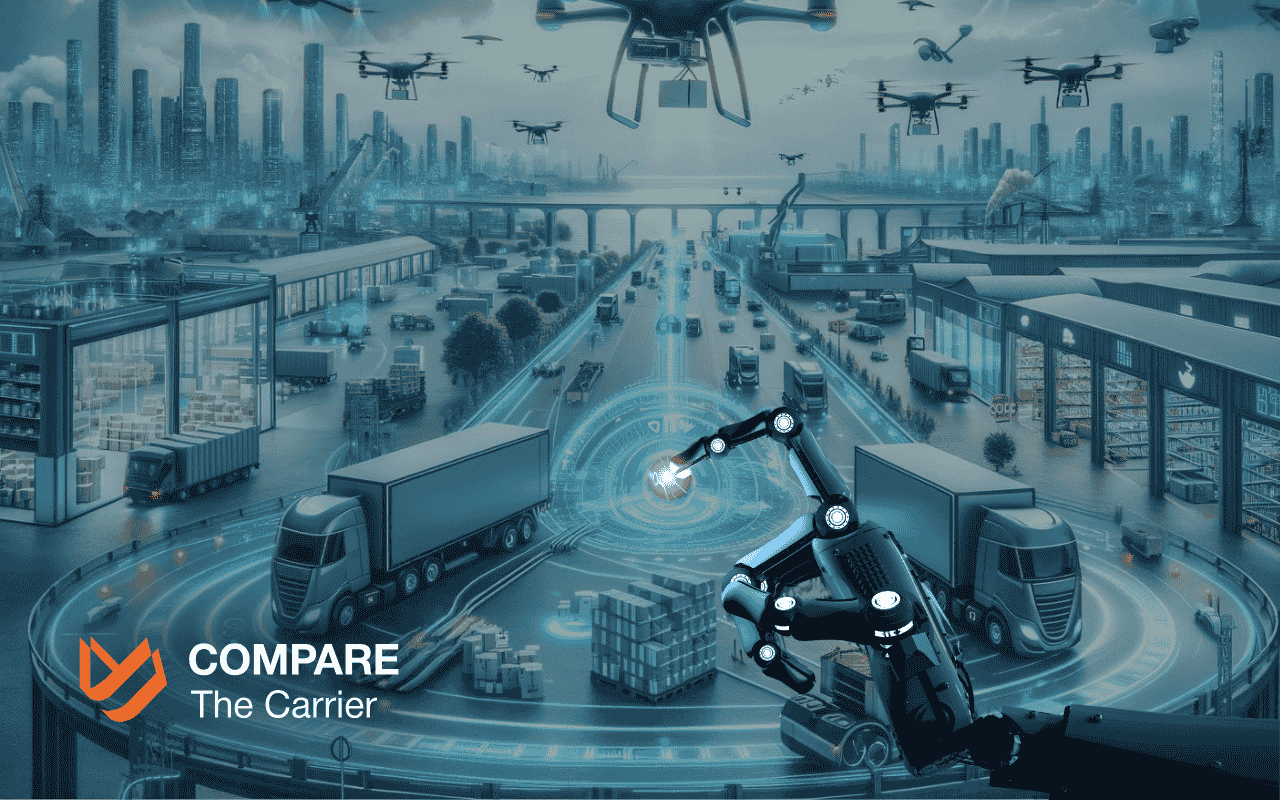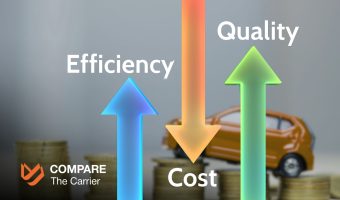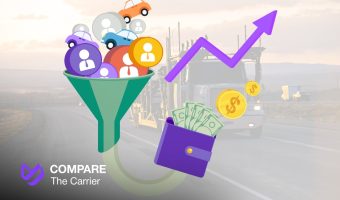The world of logistics is undergoing a significant transformation. Artificial intelligence (AI) is no longer just a buzzword; it’s becoming a game-changer for businesses and consumers alike. By leveraging AI-powered solutions, logistics companies are streamlining operations, improving efficiency, and reducing costs. This translates to faster deliveries, lower shipping expenses, and a more reliable experience for everyone involved in the supply chain.
In this article, we’ll explore how AI is transforming the logistics landscape and the real-world benefits it offers to both businesses and consumers. We’ll also delve into Compare The Carrier’s innovative use of AI to enhance your logistics experience.
The Rise of AI in Logistics
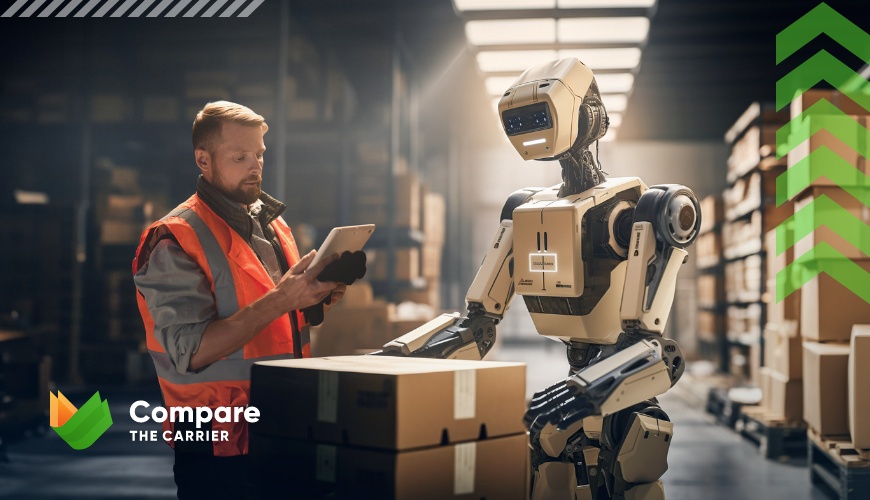
The logistics industry, long known for its complex operations and intricate networks, is undergoing a significant transformation fueled by artificial intelligence (AI). This powerful technology is no longer just a futuristic concept; it’s rapidly becoming a game-changer for businesses and consumers alike, paving the way for a future of smarter, faster, and more efficient logistics.
At the heart of this transformation lies a suite of powerful AI technologies, including:
The impact of AI in logistics extends far beyond mere automation. It’s about unlocking new levels of digital logistics efficiency and supply chain visibility. This translates to cost reductions, faster delivery times, and a more reliable experience for everyone involved – from businesses to consumers.
As AI technology continues to evolve and become more sophisticated, we can expect to see even more innovative applications emerge, further revolutionizing the way we move goods around the world.
Real-Life AI Applications in Logistics: From Chatbots to Self-Driving Trucks
The potential of AI in logistics is vast, but it’s not just a futuristic vision; it’s already transforming the industry with real-world applications that benefit both businesses and consumers. Let’s explore some compelling examples, including innovative solutions implemented by Compare The Carrier:
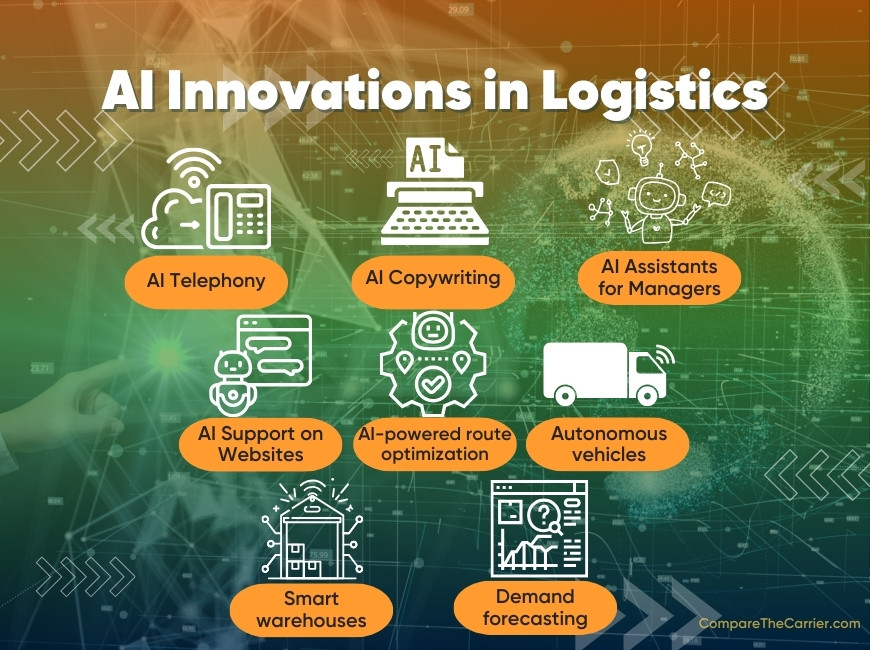
At Compare The Carrier, we’re actively harnessing the power of AI to:
Beyond Compare The Carrier: A Broader Look at AI in Action
While we’re proud of our own AI implementations, the applications extend far beyond our company. Here are some additional examples of how AI is transforming the logistics landscape:
The rise of AI in logistics is no longer a question of “if” but “when.” By harnessing the power of this transformative technology, companies can unlock new levels of efficiency, optimize operations, and deliver exceptional customer experiences.
At Compare The Carrier, we’re committed to staying at the forefront of AI innovation in the logistics industry.
Ready to experience the future of logistics?
Contact Compare The Carrier today at info@comparethecarrier.com. Our team of experts can help you leverage the power of AI to optimize your supply chain and achieve your business goals.
Benefits of AI for Logistics Companies and Customers: A Win-Win Partnership for Supply Chain Efficiency
The integration of AI into logistics isn’t just about technological advancement; it’s about creating a win-win situation for both companies and customers. Let’s explore the tangible benefits this powerful technology offers:
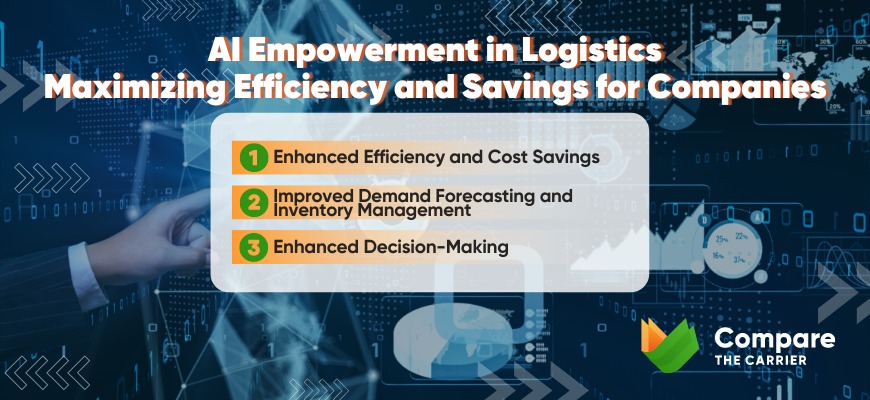
For Logistics Companies:
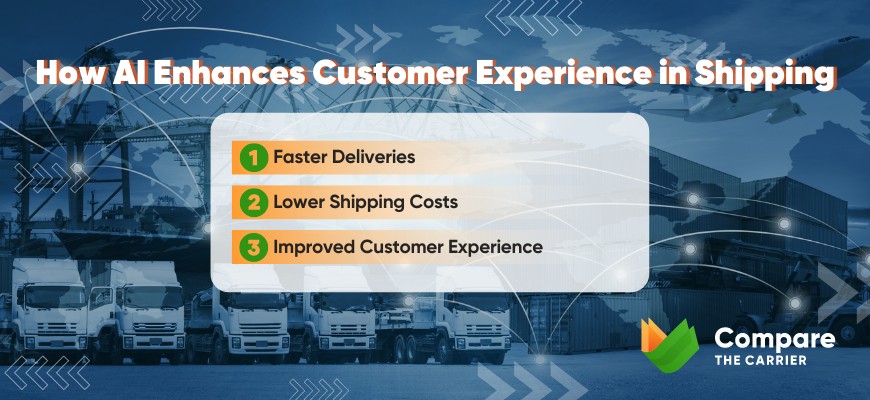
For Customers:
Compare The Carrier: Putting the Benefits of AI into Action
At Compare The Carrier, we’re committed to leveraging AI to enhance the customer experience in every aspect. Our quote comparison tool utilizes complex algorithms to analyze real-time data from various carriers, providing you with competitive quotes and the most efficient shipping options. Additionally, our AI-powered customer support is available 24/7 to answer your questions and address any concerns you may have.
The integration of AI into logistics is not just a passing trend; it’s a enormous force shaping the future of the technology in transportation industry. This powerful technology holds immense potential to revolutionize the way we manage and experience the supply chain, offering greater efficiency, cost savings, and improved customer satisfaction for all stakeholders.
At Compare The Carrier, we’re at the forefront of this exciting transformation. We are committed to leveraging the power of AI to provide you with a seamless, efficient, and cost-effective logistics experience. Whether you’re a business owner shipping across the country or an individual sending a package across town, Compare The Carrier is here to help you navigate the future of logistics.
Contact us today to learn more about how AI can optimize your supply chain and empower your business to thrive in the ever-evolving world of logistics.
FAQ
What are some specific examples of how AI is used in logistics besides the ones mentioned in the article?
AI applications in logistics extend beyond the examples mentioned. Here are a few more:
– Automated guided vehicles (AGVs): These AI-powered robots navigate warehouses autonomously, transporting goods and improving efficiency.
– Demand forecasting for perishable goods: AI can analyze historical data and weather patterns to predict demand fluctuations for perishable items, minimizing spoilage and optimizing inventory management.
– Real-time pricing: AI can analyze market conditions and competitor pricing to offer dynamic pricing models for shipping services.
Is AI replacing human jobs in logistics?
While AI automates certain tasks, it’s not replacing human jobs entirely. Instead, it’s shifting the focus of human roles. With AI handling repetitive tasks, human workers can focus on higher-level functions like strategic planning, customer service, and innovation.
Is AI secure for handling sensitive logistics data?
Compare The Carrier prioritizes data security. We implement robust security measures to protect all customer data, including information used by our AI solutions.
Can I integrate AI into my own logistics operations?
Several AI-powered logistics solutions are available for businesses of all sizes. However, the specific approach and integration process will vary depending on your unique needs and resources.
What are the limitations of AI in logistics?
While AI offers significant benefits, it’s important to acknowledge its limitations. AI algorithms are trained on data, and their effectiveness hinges on the quality and completeness of the data they are trained on. Additionally, complex decision-making and tasks requiring creativity and empathy still require human expertise.
How can I get started with using AI-powered logistics services from Compare The Carrier?
Contact us today! Our team of experts can answer your questions, assess your specific needs, and help you leverage the power of AI to optimize your logistics experience.
